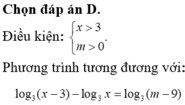Có bao nhiêu giá trị m nguyên dương để phương trình log 3 x - 3 - log 9 x 2 = log 3 m - 9 có nghiệm?
A. 9.
B. 10
C. Vô số.
D. 0
Hãy nhập câu hỏi của bạn vào đây, nếu là tài khoản VIP, bạn sẽ được ưu tiên trả lời.





Đáp án D
Điều kiện 40 < x < 60
Vậy x cần tìm theo yêu cầu đề là các số nguyên dương chạy từ 41 đến 59; trừ giá trị 50. Có tất cả 18 giá trị thỏa mãn.

a) \({3^{{x^2} - 4x + 5}} = 9 \Leftrightarrow {x^2} - 4x + 5 = 2 \Leftrightarrow {x^2} - 4x + 3 = 0 \Leftrightarrow \left( {x - 3} \right)\left( {x - 1} \right) = 0\)
\( \Leftrightarrow \left[ \begin{array}{l}x = 3\\x = 1\end{array} \right.\)
Vậy phương trình có nghiệm là \(x \in \left\{ {1;3} \right\}\)
b) \(0,{5^{2x - 4}} = 4 \Leftrightarrow 2x - 4 = {\log _{0,5}}4 \Leftrightarrow 2x = 2 \Leftrightarrow x = 1\)
Vậy phương trình có nghiệm là x = 1
c) \({\log _3}(2x - 1) = 3\) ĐK: \(2x - 1 > 0 \Leftrightarrow x > \frac{1}{2}\)
\( \Leftrightarrow 2x - 1 = 27 \Leftrightarrow x = 14\) (TMĐK)
Vậy phương trình có nghiệm là x = 14
d) \(\log x + \log (x - 3) = 1\) ĐK: \(x - 3 > 0 \Leftrightarrow x > 3\)
\(\begin{array}{l} \Leftrightarrow \log \left( {x.\left( {x - 3} \right)} \right) = 1\\ \Leftrightarrow {x^2} - 3x = 10\\ \Leftrightarrow {x^2} - 3x - 10 = 0\\ \Leftrightarrow \left( {x + 2} \right)\left( {x - 5} \right) = 0\\ \Leftrightarrow \left[ \begin{array}{l}x = - 2 (loại) \,\,\,\\x = 5 (TMĐK) \,\,\,\,\,\,\,\end{array} \right.\end{array}\)
Vậy phương trình có nghiệm x = 5

\(a,\left(0,3\right)^{x-3}=1\\ \Leftrightarrow x-3=0\\ \Leftrightarrow x=3\\ b,5^{3x-2}=25\\ \Leftrightarrow3x-2=2\\ \Leftrightarrow3x=4\\ \Leftrightarrow x=\dfrac{4}{3}\\ c,9^{x-2}=243^{x+1}\\ \Leftrightarrow3^{2x-4}=3^{5x+5}\\ \Leftrightarrow2x-4=5x+5\\ \Leftrightarrow3x=-9\\ \Leftrightarrow x=-3\)
d, Điều kiện: \(x>-1;x\ne0\)
\(log_{\dfrac{1}{x}}\left(x+1\right)=-3\\ \Leftrightarrow x+1=x^3\\ x\simeq1,325\left(tm\right)\)
e, Điều kiện: \(x>\dfrac{5}{3}\)
\(log_5\left(3x-5\right)=log_5\left(2x+1\right)\\ \Leftrightarrow3x-5=2x+1\\ \Leftrightarrow x=6\left(tm\right)\)
f, Điều kiện: \(x>\dfrac{1}{2}\)
\(log_{\dfrac{1}{7}}\left(x+9\right)=log_{\dfrac{1}{7}}\left(2x-1\right)\\ \Leftrightarrow x+9=2x-1\\ \Leftrightarrow x=10\left(tm\right)\)

\(a,\left(\dfrac{1}{4}\right)^{x-2}=\sqrt{8}\\ \Leftrightarrow\left(\dfrac{1}{2}\right)^{2x-4}=\left(\dfrac{1}{2}\right)^{-\dfrac{3}{2}}\\ \Leftrightarrow2x-4=-\dfrac{3}{2}\\ \Leftrightarrow2x=\dfrac{5}{2}\\ \Leftrightarrow x=\dfrac{5}{4}\)
\(b,9^{2x-1}=81\cdot27^x\\ \Leftrightarrow3^{4x-2}=3^{4+3x}\\ \Leftrightarrow4x-2=4+3x\\ \Leftrightarrow x=6\)
c, ĐK: \(x-2>0\Rightarrow x>2\)
\(2log_5\left(x-2\right)=log_59\\
\Leftrightarrow log_5\left(x-2\right)^2=log_59\\
\Leftrightarrow\left(x-2\right)^2=3^2\\
\Leftrightarrow\left[{}\begin{matrix}x-2=3\\x-2=-3\end{matrix}\right.\\
\Leftrightarrow\left[{}\begin{matrix}x=5\left(tm\right)\\x=-1\left(ktm\right)\end{matrix}\right.\)
Vậy phương trình có nghiệm là x = 5.
d, ĐK: \(x-1>0\Leftrightarrow x>1\)
\(log_2\left(3x+1\right)=2-log_2\left(x-1\right)\\ \Leftrightarrow log_2\left(3x+1\right)\left(x-1\right)=2\\ \Leftrightarrow3x^2-2x-1=4\\ \Leftrightarrow3x^2-2x-5=0\\ \Leftrightarrow\left(3x-5\right)\left(x+1\right)=0\\ \Leftrightarrow\left[{}\begin{matrix}x=\dfrac{5}{3}\left(tm\right)\\x=-1\left(ktm\right)\end{matrix}\right.\)
Vậy phương trình có nghiệm \(x=\dfrac{5}{3}\)

a) Với \(x = 1\) thì \(y = {\log _2}1 = 0\)
Với \(x = 2\) thì \(y = {\log _2}2 = 1\)
Với \(x = 4\) thì \(y = {\log _2}4 = 2\)
b) Biểu thức \(y = {\log _2}x\) có nghĩa khi x > 0.

Điều kiện: x > 3 m > 0
Phương trình tương đương với:
![]()
![]()
Vì 0 < x - 3 3 = 1 - 3 x < 1 , ∀ x ∈ 3 ; + ∞ do đó phương trình có nghiệm
⇔ 0 < m - 9 < 1 ⇔ 9 < m < 10 . Vì vậy không có số nguyên nào thoả mãn.
Chọn đáp án D.